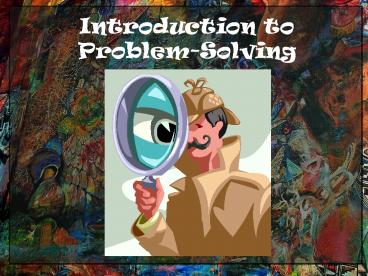Introduction to ProblemSolving - PowerPoint PPT Presentation
1 / 9
Title:
Introduction to ProblemSolving
Description:
A situation where an individual or group. accepts the challenge of performing a ... Ray Bradbury. http://www.amazon.com/gp/product/customer-images ... – PowerPoint PPT presentation
Number of Views:49
Avg rating:3.0/5.0
Title: Introduction to ProblemSolving
1
Introduction to Problem-Solving
2
What is Problem- Solving?
- A situation where an individual or groupaccepts
the challenge of performing atask for which
there is no immediatelyobvious way to determine
a solution
3
What does problem-solving involve?
- SKILLS (Computation)
- A STRATEGY (Plan of Action)
- CREATIVITY
- TENACITY (When the going gets tough, the tough
get going) - CONFIDENCE!!!
4
Four Step Method for Problem-Solving
- Think about the problem and investigate what the
question is asking you to find out - Choose a strategy
- Carry out your plan
- Re-read the question and ask if your answer makes
sense then check your work!
5
Step 1Think about the problem
- What does the problem mean?
- What is the question you need to answer?
- Understand the words, phrases, and what is
happening in the problem - Identify important and unimportant information
6
Step 2Select a Strategy
- Make a table
- Make a list
- Act out or use manipulatives
- Look for a pattern
- Make a picture or diagram
- Use logical reasoning
- Guess and check
- Make it simpler
- Work backwards
- Brainstorm
7
Step 3Carry Out Your Plan
- Work through the problem and make sure your
answer makes sense! - If you think your answer is incorrect, try
another plan. Make sure you record the methods
you have tried! - To quote Billy Ocean, remember that when the
going gets tough, the tough gets going! Dont
give up if you feel stuck!
8
Step 4Look Back and Check Your Work!
- Reread the problem and check to make sure your
solution is answering the question - Ask yourself if the solution is REASONABLE and
LOGICAL - Check your work to make sure you have not make
any calculation errorscareless mistakes are
totally preventable!
9
I know you've heard it a thousand times before.
But it's true -- hard work pays off. If you want
to be good, you have to practice, practice,
practice! Ray Bradbury
http//www.amazon.com/gp/product/customer-images/































